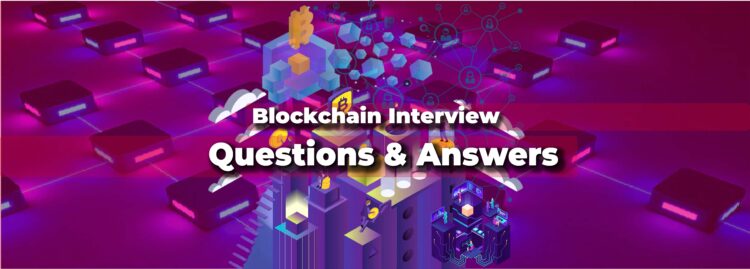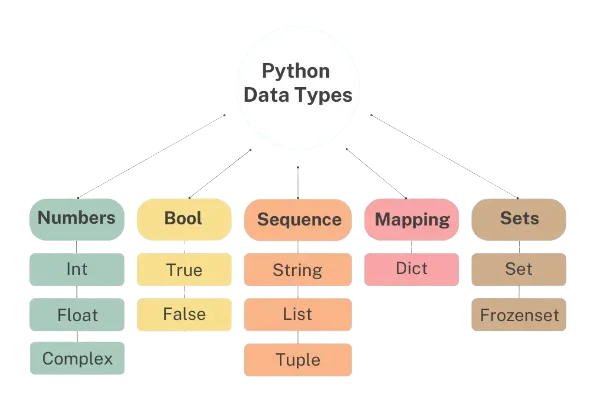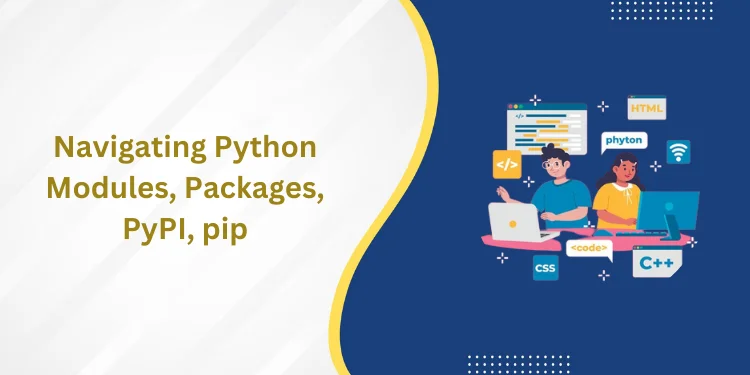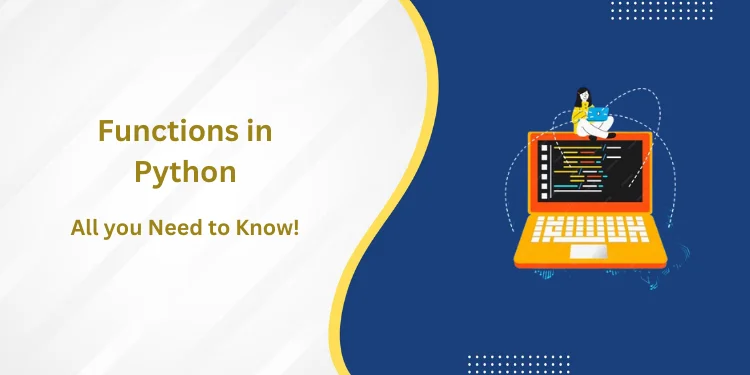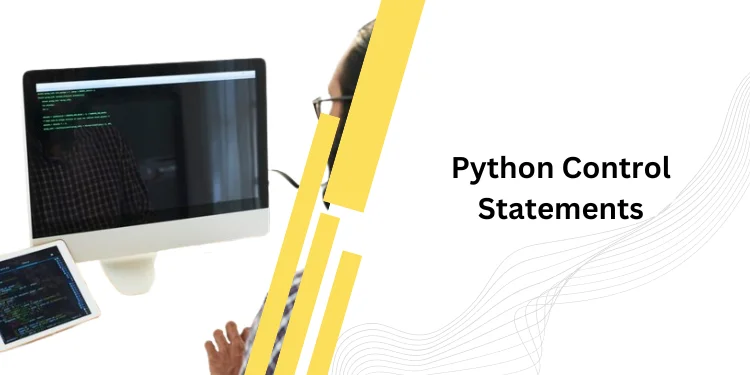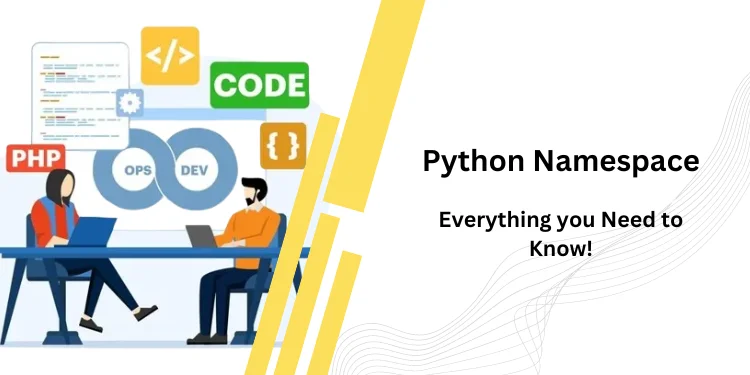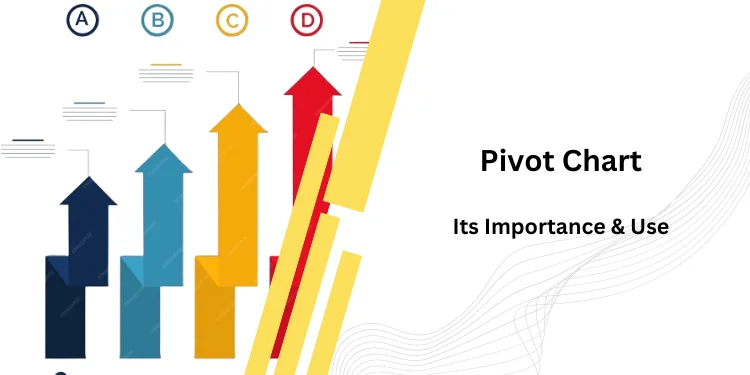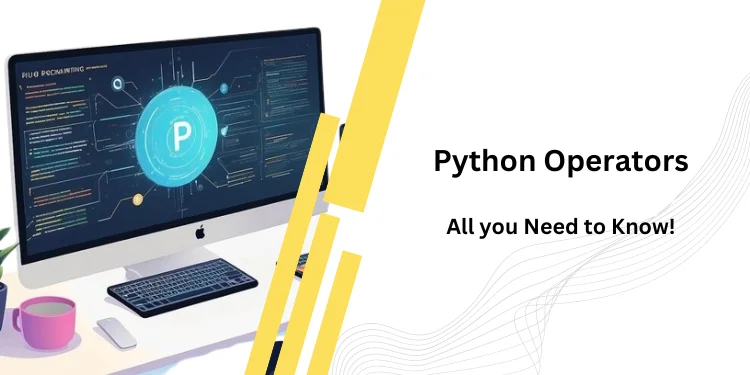Introduction To Blockchain Interview Questions
The term “blockchain” is the most recent buzzword in the market. Bitcoin is fantastic, but the technology that underpins it has enormous potential. Something that began as a process of development will soon become a revolution. Investors are raking in large sums of money because they recognize that this brilliant technology has a promising future. Every day, industry professionals and IT enthusiasts come up with new blockchain-based products. So don’t put it off any longer; use these Blockchain Interview Questions to get industry-ready.
So, if you want to start a career in Blockchain, now is the time to get your Blockchain certification and plunge in while the technology is still in its infancy.
I’ve included the most often asked blockchain interview questions by interviewers in this Blockchain interview questions blog. These questions were compiled following consultations with leading industry experts in the fields of Blockchain and related technologies.
What is BlockChain?
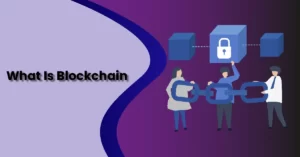
A blockchain is a continuously increasing ledger(file) that retains a secure, chronological, and immutable record of all transactions that have occurred. It can be used to send money, property, contracts, and other items securely without the need for a third-party middleman such as a bank or government. The most well-known cryptocurrency, Bitcoin, is built on the blockchain technology. It’s a peer-to-peer electronic cash system and a decentralized network that lets users conduct transactions without the need for a third-party to handle the transaction. These Blockchain interview questions will help you to get a better understanding
All of the questions offered here are commonly asked in many blockchain interview questions and will help you land your desired job in this field. But, before we get into the interview questions, let’s have a look at the market demand for Blockchain.
- The business value of blockchain, according to Gartner, will approach $3.1 trillion by 2030.
- According to Glassdoor, the Blockchain employment market is expanding, with plenty of chances in a variety of industries.
- A Blockchain professional’s average annual compensation is roughly $1,32,000 dollars.
According to the statistics above, Blockchain has a high demand in the market, and you may make a good living as a Blockchain developer. However, there is a lot of rivalry among Blockchain job seekers, and getting through the interview isn’t easy. The blockchain industry is booming with numerous opportunities. By 2018, about 90% of US and European banks have begun to investigate blockchain’s potential. 74% of tech-savvy executive teams believe blockchain technology has enormous business potential. Between $5 million and $10 million are expected to be invested in blockchain by 24% of businesses. To know more about stats you can click here. These Blockchain interview questions will help you to get a better understanding.
Future and Scope
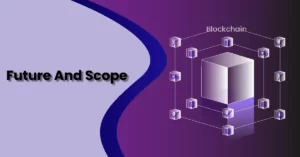
Apart from documenting financial transactions, blockchain may also be used to store medical information, reach binding agreements, trace the flow of commodities, store personal credit records, track the provenance of artwork, verify payments across a supply chain, and much more. Financial institutions have invested $552 million in blockchain-based projects alone. The concept of a national cryptocurrency has been adopted or investigated by more than 20 countries.
If you’ve been following cryptocurrency, you’re probably already aware that Blockchain technology is at the heart of Bitcoin. Blockchain is an immutable and un-hackable digital ledger that keeps track of transactions in a permanent and verifiable way. But first, consider the future of blockchain technology and its potential in the next years. These Blockchain interview questions will help you to ace the interview
Future in Cybersecurity
Blockchain technology’s future potential is mostly in the sphere of cybersecurity, for obvious reasons. The data is protected and verifiable, despite the fact that the Blockchain ledger is open and dispersed. To eliminate risks such as illegal data manipulation, the encryption is done using cryptography.
Future in Cloud Storage
Data hacking, loss, and human mistake are all risks associated with centralized systems. Cloud storage may be made more secure and resistant to hacking by implementing Blockchain technology, just as it can be in cybersecurity.
Future in Internet of Things (IoT) and Networking
Blockchain technology is being used by companies like IBM and Samsung to create a distributed network of IoT devices. The concept is known as ADEPT, and it intends to eliminate the need for a centralized site to coordinate communication between devices for tasks such as software upgrades, error handling, energy conservation, and so on.
Future in Digital Advertising
Due to the difficulties that digital advertising faces, such as bot traffic, lack of transparency, domain fraud, inefficient payment processes, and so on, promoters and publishers are having a difficult time due to unethical actors. Blockchain has been discovered to overcome such supply chain difficulties due to its transparency and trustworthiness.
These Blockchain interview questions will help you to get a better understanding. Advertisement-related transactions can be handled more efficiently using this technology, resulting in increased productivity.
Despite the fact that Blockchain is at the peak of its growth, there is a shortage of Blockchain engineers and experts on the employment market. If you invest in Blockchain technology now, you will reap the benefits afterwards. This is an excellent opportunity to become acquainted with Blockchain interview questions to excel in blockchain technology.
Blockchain Interview Questions For Freshers
- What are the different types of Blockchains?
- Public Blockchain
A “for the people, by the people, and of the people” blockchain is known as a public blockchain. The blockchain has no in-charge, which means anyone can read, write, and audit it. Anyone may evaluate anything on a public blockchain because it is open-source, distributed, and decentralized. Permissionless blockchain is what they’re called.
- Private Blockchain
A private blockchain is one that belongs to an individual or a company. It is governed by a single organization, which controls who is allowed to read it, submit transactions to it, and participate in the consensus process. Permissioned blockchains are what they’re called.
- Federated Blockchain vs. Consortium Blockchain
The consensus process in this blockchain is managed by a pre-selected organization, such as a group of firms or a representative individual. These pre-selected individuals are getting together to make judgments that will benefit the entire network. Because of the moniker consortium or federated blockchain, such groupings are also known as consortiums or federations.
These Blockchain interview questions will help you to get a better understanding.
- What are the advantages of blockchain technology?
- Real-time settlement: Blockchain has the potential to speed up trade settlement in the financial industry. Because all stakeholders have access to a single version of agreed-upon data, the verification, settlement, and clearing procedure does not take long.
- Cost-cutting: Blockchain allows peer-to-peer transactions to be conducted without the involvement of a third party, such as a bank, lowering transaction costs.
- Security and Resilience: Blockchain employs cutting-edge cryptography to ensure that the information stored within the blockchain is protected against hackers and fraud. It employs Distributed Ledger Technology, in which each party keeps a copy of the original chain, ensuring that the system continues to function even if a substantial number of other nodes fail.
- Immutability: Transactions on a blockchain are recorded in chronological sequence, meaning that each transaction occurs after the one before it. The chronological order ensures the immutability of all blockchain processes. It means that a new block cannot be withdrawn or amended once it has been added to the chain of ledgers.
- User Pseudonymity: This is a situation in which a user has a unique identifier that is not their real name. Only admins have access to the true identities. It lets users connect with one another while remaining largely anonymous. It helps to protect user privacy and allows for unrestricted transactions with no security concerns. Your pseudonym is the address to which you get Bitcoin in blockchain. Every transaction involving the address is recorded in the blockchain for all time.
- What are Merkle trees? What role does it play in the blockchain?
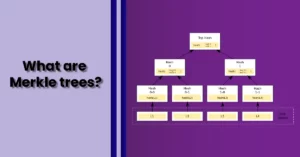
The Merkle tree is a key component of blockchain technology. It’s a mathematical data structure made up of hashes of various data blocks that acts as a summary of all the transactions in a block. It also enables quick and secure content verification across a big dataset. It also aids in the verification of data consistency and content. Merkle Trees are used by both Bitcoin and Ethereum. Hash Tree is another name for Merkle Tree.
These Blockchain interview questions will help you to get a better understanding. In blockchain technology, the Merkle tree is extremely important. There is no need to download the full block to validate the existence of a specific transaction in a block if someone only needs to verify the transaction in a block. He can only download the block header chain. It is sufficient to download a collection of a branch of the tree that contains this transaction. The hashes that are relevant to your transactions are checked. If these hashes match, we can be confident that this transaction is present in this block.
- What is the meaning of double spending? Is it feasible in a Blockchain system to spend twice?
The term “double spending” refers to spending the same amount of money more than once. The problem of double-spending cannot exist with tangible money. However, in digital cash such as bitcoin, the problem of double-spending can occur. As a result, there’s a chance that Bitcoin transactions will be replicated and replayed. It enables the owner of a bitcoin to spend the same bitcoin twice. One of the main goals of Blockchain technology is to abolish this method as much as feasible.
Blockchain eliminates the problem of double-spending by requiring many participants to confirm a transaction before it is put into the ledger. These Blockchain interview questions will help you to get better knowledge.
- Why is Blockchain such a reliable method?
Because of the following factors, a blockchain is a trustworthy approach:
- Due to its open-source nature, it is easily interoperable with various business software.
- It is secure, unhackable, and encrypted.
- It is not under the control of a central authority.
- The way a transaction was entered into the blockchain was agreed upon by all participants.
- The transaction is immutable, which means it cannot be changed once it has been entered into the blockchain.
- What is the meaning of secret sharing? Is there any benefit to it in terms of Blockchain technology?
It is common knowledge that security is extremely important in digital transactions. A method for doing so is secret sharing. It is a method in Blockchain technology that breaks private or personal information into smaller parts and sends them to users on the network. These Blockchain interview questions will help you to get a better understanding.
Only when a person who is given a share of the secret agrees to combine it with others can the original knowledge be integrated. Blockchain technology can provide a number of security-related benefits.
- What Is the Difference Between Blockchain and Banking Ledgers?
Ledgers are used by banks and accounting systems to track and time stamp transactions. The blockchain, on the other hand, is entirely decentralised and open source. People no longer have to rely on or trust the central bank to maintain track of their transactions. All transactions can be tracked using peer-to-peer blockchain technology, which eliminates the risk of them being wiped or lost. These Blockchain interview questions will help you to get a piece of better knowledge.
Furthermore, because to its open-source nature, the blockchain is more versatile and configurable than central bank ledgers. If blockchain coders require additional functionality, they can simply build on top of current software using consensus. Because of all of their laws and central points of failure, this is tough for central banks.
- What problems might an organisation face as a result of an information leak?
An information leak can severely damage an organization’s reputation. Furthermore, it may be the cause of significant losses for the firm. Many firms that fail to establish security policies to keep their data secure have already lost their consumers’ trust and are working extremely hard to regain it. If little attention is paid to the security of online transactions, a company’s overall earnings can drop by up to 80%. These Blockchain interview questions will help you to get a better understanding.
- What is the definition of a security policy?
A security policy specifies what must be protected on a system. It binds a network user to a set of fundamental protocols that they must all agree to and obey in order to improve overall security. When it comes to an organization’s information or financial records, many security rules are adopted rather than simply one.
- What are the steps needed in implementing a Blockchain project?
This procedure has a total of six steps, which are as follows:
- Identifying the requirements
- Consideration of screen ideas
- Blockchain project development
- Security feasibility study
- Implementation
- Managing and overseeing the project
Blockchain Interview Questions For Experienced
In this section, I’ll be covering the advanced Blockchain interview questions asked by the candidates. These Blockchain interview questions will help you ace the interview. These Blockchain interview questions are asked if you clear the beginner questions. These questions are asked with the mot
ive of measuring how much knowledge and skill you have for that specific technical skill. Let’s get started.
- What distinguishes a blockchain distributed ledger from a traditional ledger?
Let’s have a look at first Blockchain Interview Questions For Experienced and how to answer them. You can divide the answer of Blockchain Interview Questions For Experienced into the points:
- When compared to a traditional ledger, a Blockchain distributed ledger is extremely transparent.
- Distributed ledgers on the blockchain are irreversible. A distributed ledger’s data is immutable, whereas a standard ledger’s data is reversible.
- It is more secure to use a distributed ledger. It makes use of encryption, and each transaction is hashed and logged, whereas the security of a regular ledger can be jeopardised.
- It is a distributed system, and the participants are in charge of maintaining the network’s sanity and validating transactions. Traditional ledgers are built on the concept of centralised control, in which all transactions are under the control of a single entity.
- Data modification or change is not feasible in a distributed ledger, but it is possible in a traditional ledger.
- Validation is done by the network members in a distributed ledger, whereas validation is done by a centralized authority in a traditional ledger.
- In a distributed ledger, participants share a copy of the ledger, whereas in a traditional ledger, a single copy is kept in a centralized location. It is not distributed to the participants.
- How do you recognize a block?
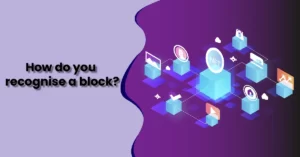
Each block is made up of four fields:
- The previous block’s hash value (thereby getting linked in a blockchain)
- It contains information about several transactions.
- It has a value that is known as the nonce. The nonce is a random value that is used to change the hash value in order to obtain a hash value that is smaller than the target.
- The hash of the block. It’s the block’s digital signature as well as an alphanumeric value that’s used to identify it.
The hash address is the block’s unique identification. It’s a 64-character hex value with both letters and digits. The SHA-256 methods are used to generate it. It is an advanced Blockchain Interview Questions For Experienced.
- What is cryptography and how does it work? What role does it play in the blockchain?
With a hash function, blockchain secures users’ identities and ensures transactions are completed safely.
To encrypt and decrypt data, cryptography employs public and private keys. A public key can be shared with all Bitcoin users on the Blockchain network, but a private key (similar to a password) is kept private.
Blockchain employs the safe SHA-256 algorithm, which generates a unique hash output for each input. The primary feature of this method is that it will output a standard alphanumeric output of 64 characters regardless of the input. It’s a one-way function, meaning you can get an encrypted value from the input but not the other way around. It is an advanced Blockchain Interview Questions For Experienced.
- List and describe the various components of EVM memory.
An EVM’s memory is divided into three types:
- Storage:
Storage values are stored permanently on the Blockchain network.
It is highly costly.
- Memory:
Memory is a type of temporary storage that can be changed.
It can only be accessible when the contract is being executed. The data is lost once the program is completed.
- Stack:
A stack is a type of storage that is both transitory and non-modifiable.
The content is lost when the execution is finished.
- Determine the difference between Proof of Work and Proof of Stake.
- Proof of Work (PoW):
The amount of computing work done by a miner determines the likelihood of mining a block. Miners devote a significant amount of computational power (in the form of hardware) to solving the cryptographic puzzle.
- Proof of Stake (PoS):
Proof of Stake (PoS) is a distributed consensus algorithm that is an alternative to Proof of Work (PoW). The quantity of tokens you own determines your chances of validating a block. You have more opportunities to validate a block if you have more tokens. It was developed as a means of reducing the usage of expensive mining resources.
- What are function modifiers in Solidity? Mention some of the most common modifiers.
It is an advanced Blockchain Interview Questions For Experienced. You can answer this Blockchain Interview Questions, “Using function modifiers in Solidity, you can quickly change the behavior of your smart contract functions. In simple terms, it can add new capabilities to smart contracts or restrict their functionality. The following are the most commonly used function modifications in solidity:
- Views, are functions that are unable to change the state of a smart contract. These functions are read-only. To see an example of a View function, see our video.
- Pure, which are functions that don’t read or write a smart contract’s state. They both return the same result based on the input data. To view an example of a Pure function.”
- Where do smart contract nodes run their code?
On the Ethereum Virtual Machine, nodes run smart contract code (EVM). It’s an Ethereum-based smart contract runtime environment in the form of a virtual machine. EVM runs in a secure sandboxed environment (isolated from the main network). This is an ideal setting for testing.
You can download the EVM, run your smart contract locally in an isolated environment, and then deploy it to the main network once it has been tested and verified. It is an advanced Blockchain Interview Questions For Experienced.
- What is the concept of double-spending?
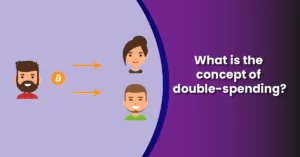
Because the same digital tokens are utilized several times, double-spending is considered a potential vulnerability in the digital payment concept. The tokens are usually made up of easily cloneable digital data.
Waiting for confirmations while making payments on the blockchain protects Bitcoin users from double-spending frauds; as the number of confirmations increases, the transactions become more irrevocable.
- What exactly is a 51% attack?
A 51% attack, also known as a double-spend attempt, occurs when a single miner or a group of miners tries to control more than 50% of the network’s mining hash rate or computer power. These criminals attempt to block fresh transactions from receiving confirmations, allowing them to suspend payments between some or all users.
They can also reverse transactions that have already been done while in control of the network, which means they might spend money twice.
- What are Merkle trees? What role does it play in the blockchain?
In blockchain technology, the Merkle tree is extremely important. It refers to a mathematical data structure made up of several data pieces. It also provides a digital fingerprint of the complete collection of transa
ctions, which summarizes all of the transactions in a block.
It provides for quick and secure content verification over a vast amount of data. Ethereum and Bitcoin both use the Merkle tree, which is also known as a Hash tree. The value of a Merkle tree in the blockchain is that if someone wishes to validate a certain transaction in a block, they can download the chain of block headers rather than downloading each transaction and block individually. It is an advanced Blockchain Interview Questions For Experienced.
Conclusion
This brings us to the greatest blockchain interview questions and answers for both new and seasoned blockchain professionals. All of these blockchain interview questions can help you prepare for the big interview. But keep in mind that if you want to ace a blockchain interview, you’ll need to prepare thoroughly. So make sure you look over all of the questions and have a good understanding of the material.
Without a question, the benefits of Blockchain technology will entice businesses and organizations all over the world to invest more in it. Although it is still in its early stages, this, one of the most recent technologies, will take some time to gain traction and will necessitate patience.
However, the benefits of Blockchain are difficult to overlook, and the technology will undoubtedly benefit a variety of businesses since the verification of every piece of data that enters and exits these Blockchain systems will mitigate many risks. I hope these blockchain interview questions will help you ace your blockchain interview.
Frequently Asked Question’s
1. How do I prepare for a blockchain interview?
You’ll need to master all of the principles of Blockchain interview questions and ensure that you’re prepared for your unique blockchain-related vocation. Preparing for a blockchain interview is difficult. Blockchain is unquestionably one of the market’s brightest newcomers. As a result, there are a lot of people looking for blockchain expertise currently. However, you’ll need the right abilities to ace the blockchain interview questions.
Aside from these, there are numerous more vital elements to consider before to attending an interview. So, in order to assist you, I’m going to list the skills you’ll need to master. I’ll also give you some advice on how to ace your blockchain interview in our blog. For more information, read our blog on blockchain interview questions.
2. Are blockchain skills in demand?
Blockchain has made inroads into a variety of businesses, far beyond its cryptocurrency roots and these Blockchain interview questions will help you. As a result, the demand for developers competent in creating blockchain networks and apps has skyrocketed, prompting many people to seek a career in blockchain development. For more information, read our blog on blockchain interview questions.
3. Are blockchain engineers in demand?
This is another another excellent choice for you to consider. In reality, straight after blockchain professionals, there is another attractive job prospect. The problem is that your obligations in this role may differ from one organization to the next. Blockchain interview questions will help you get familiar with blockchain.
You may be required to take on the job of developer in some circumstances, while in others you may be required to work on the project’s architecture. As a result, make sure you know how Corda, Hyperledger, and Ethereum work. Every year, this blockchain profession pays between $104k and $186k! For more information, read our blog on blockchain interview questions.
4. Why do you want to work in blockchain?
You’ll be able to operationalize blockchain technology, alter stagnant sectors, and develop enhanced business models if you have capabilities in blockchain-enabled business. This skill set will not only help you grow into senior positions, but it will also put you at the forefront of change. Blockchain interview questions will help you to understand major blockchain concepts.
When it comes to corporate collaboration, technology deployment, and supply chain reconfiguration, you might be the decision-maker thanks to blockchain. You might also help your company transition into the new era of cybersecurity, governance, and sustainability. For more information, read our blog on blockchain interview questions.
What is minting in blockchain?
Minting cryptocurrency is the process of creating new currencies through the authentication of data, the creation of new blocks, and the recording of the information onto the blockchain via a “proof of stake” protocol. Both are digital currencies. Bitcoin and Ethereum, for example, are growing increasingly popular. For more information, read our blog on blockchain interview questions.
Blockchain development is one of the fastest-growing industries in the labour market, with more job vacancies than skilled developers. A successful career in blockchain engineering offers a variety of job opportunities as well as the chance to work on cutting-edge projects. For more information, read our blog on blockchain interview questions.
7. Can you get a job in blockchain?
It’s not easy to get a job in the blockchain industry. To become a professional, you must work hard and develop a variety of talents. However, with the right guidance, you can learn how to land a job in the blockchain industry. The average blockchain job compensation for this role is between $150k and $175k. Read our blog on blockchain interview questions to understand blockchain concepts better.
It can, however, go up to $200,000. It’s best if you have a lot of experience. In practice, you’ll need to know how to program. Aside from that, you’ll require knowledge of Python, XCOD, MVC, SDL, C, SOAP, C++, AJAX, Solidity, and other programming languages. For more information, read our blog on blockchain interview questions.
8. Is learning blockchain hard?
Blockchain can appear to be a difficult technology to grasp because to its perceived complexity. You can master this technology and pursue an exciting new career if you have the proper prerequisite abilities. Such skills can be acquired through a variety of educational avenues, including an immersive online fintech boot camp, a traditional college degree in a relevant discipline, or self-study with these Blockchain interview questions.
For more information, read our blog on blockchain interview questions. Our blog on blockchain interview questions can help you get familiar with blockchain.
9. Is coding required for blockchain?
All of a developer’s current abilities are applicable to blockchain technology. As a result, becoming a blockchain developer necessitates knowledge of data structures, web development, and a fundamental programming language. For more information, read our blog on blockchain interview questions.
10. Do blockchain jobs pay well?
Around 25% of the industry has adopted blockchain technology and is actively developing blockchain-based applications. Blockchain professions are becoming increasingly popular, and the pay scale for blockchain specialists is quite high and more than adequate. For more information, read our blog on blockchain interview questions.

